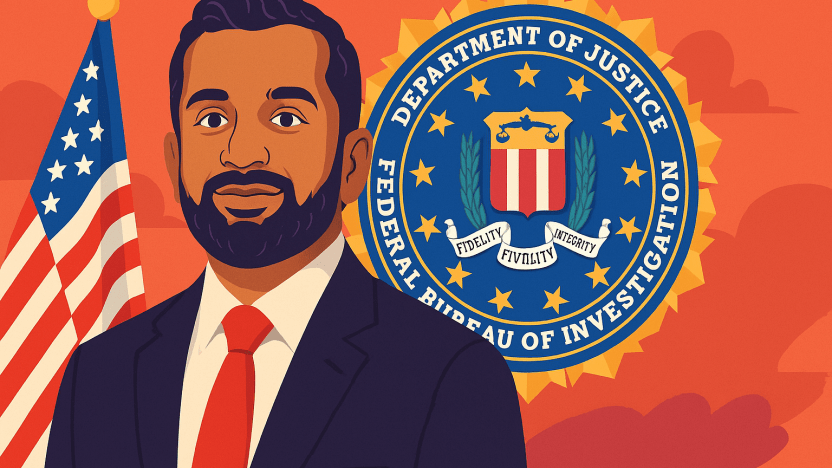Donald Trump’s nomination of Kash Patel as the new FBI Director marks a significant shift in federal law enforcement leadership. This appointment signals a potential transformation in the agency’s direction, with Patel’s strong ties to Trump and his critical stance toward the FBI drawing national attention.
The nomination represents a direct challenge to current FBI Director Christopher Wray’s leadership. Patel’s appointment could reshape the agency’s priorities, investigative practices, and organizational structure. His proposed reforms aim to limit FBI authority – changes that would affect law enforcement operations across the United States.
This development raises crucial questions about the future of federal law enforcement and its relationship with presidential administrations. As citizens, understanding these changes becomes essential for navigating the evolving landscape of American justice and security.
Who is Kash Patel? A Brief Background
Kash Patel’s rise through the ranks of government service reflects a trajectory marked by strategic positioning and unwavering loyalty. His career began as a public defender in Florida before transitioning to the Department of Justice as a national security prosecutor.
His prominence escalated during his tenure in the Trump administration, where he held several critical positions:
- Chief of Staff to Acting Secretary of Defense Christopher Miller
- Senior Director of Counterterrorism at the National Security Council
- Principal Deputy to the Acting Director of National Intelligence
- Senior Counsel for the House Intelligence Committee
Patel’s experience in national security and intelligence operations stems from his direct involvement in high-profile investigations. He played a pivotal role in crafting the Nunes memo, which questioned the FBI’s surveillance practices during the Russia investigation.
His legal background includes a J.D. from Pace University School of Law and a bachelor’s degree from the University of Richmond. Patel’s expertise spans counterterrorism, national security law, and federal law enforcement operations – areas directly relevant to the FBI’s core mission.
Why Did Trump Choose Patel? Analyzing the Reasons Behind the Nomination
Trump’s selection of Kash Patel as FBI Chief stems from a deteriorating relationship with current Director Christopher Wray. The rift between Trump and Wray deepened during investigations into classified documents at Mar-a-Lago, with Wray’s perceived lack of loyalty becoming a significant point of contention.
Patel represents a stark contrast to Wray’s independent leadership style. His unwavering support for Trump’s positions, particularly:
- The Russia investigation
- Hunter Biden laptop controversy
- Mar-a-Lago document handling
These alignments make him an attractive choice for Trump’s vision of FBI leadership.
The nomination reflects Trump’s broader strategy of positioning trusted allies in key federal positions. Patel’s previous role in challenging FBI practices aligns with Trump’s criticism of the agency’s “weaponization” against political figures.
This appointment would grant Trump significant influence over federal law enforcement operations, with Patel’s demonstrated willingness to pursue investigations aligned with Trump’s interests. His nomination signals a potential shift from the FBI’s traditional independence toward a more politically responsive agency.
Patel’s Controversial Views: A Closer Look at His Criticism of the FBI
Kash Patel’s stance toward the FBI reflects deep-seated skepticism about the agency’s practices and authority. His published work, “Government Gangsters: The Deep State, the Truth, and the Battle for Our Democracy,” presents a scathing critique of federal law enforcement agencies.
The memoir details what Patel describes as systemic issues within the FBI:
- Alleged Political Bias: Claims of targeted investigations against conservative figures
- FISA Court Concerns: Documentation of perceived abuse in surveillance warrant processes
- Internal Power Structure: Arguments against concentrated authority in agency leadership
Patel’s criticism extends beyond his written work. During media appearances and congressional testimonies, he has consistently challenged the FBI’s investigative methods, particularly regarding:
- Foreign intelligence operations
- Domestic surveillance protocols
- Internal accountability measures
His public statements have garnered significant attention, with supporters viewing him as a whistleblower exposing governmental overreach, while critics question the validity of his claims. These perspectives have shaped the discourse surrounding his nomination as FBI Chief and potential reforms under his leadership.
What Changes Can We Expect? Proposed Reforms Under Patel’s Leadership
Kash Patel’s proposed reforms signal a significant shift in the FBI’s operational framework. His reform agenda centers on three primary areas:
1. Restructuring Internal Oversight
- Creation of an independent review board
- Implementation of stricter accountability measures, including recommendations from the Justice Department’s Office of Inspector General
- Reduction of autonomous decision-making powers
2. Limiting Surveillance Authority
- Narrowing the scope of FISA warrant applications
- Restricting electronic surveillance capabilities
- Adding layers of approval for domestic investigations
3. Organizational Changes
- Decentralizing power from FBI headquarters
- Redistributing resources to field offices
- Establishing new protocols for sensitive investigations
These reforms align with Patel’s vision of reducing perceived government overreach. The proposed changes would fundamentally alter the FBI’s investigative processes, particularly in high-profile cases. Under this new structure, field agents would face additional oversight requirements, while headquarters would see reduced authority in directing nationwide operations.
The reforms also introduce mandatory external reviews for sensitive investigations, a departure from current practices where internal supervision predominates. This shift reflects Patel’s emphasis on external accountability and his stated goal of preventing what he terms “institutional abuse of power.”
Implications for Federal Law Enforcement Agencies: A Broader Perspective
Trump’s nomination of Kash Patel as FBI Director, coupled with Chad Chronister’s appointment to lead the DEA, reveals a strategic pattern of positioning trusted allies in critical law enforcement roles. This coordinated approach signals a significant shift in federal law enforcement leadership dynamics.
These appointments could reshape federal law enforcement in several ways:
- Increased Alignment: Law enforcement agencies may adopt policies that closely mirror Trump’s vision for national security and criminal justice
- Inter-Agency Cooperation: The FBI and DEA could experience enhanced coordination under leadership teams sharing similar ideological perspectives
- Policy Implementation: New directives might prioritize specific types of investigations and enforcement actions aligned with Trump’s agenda
The potential restructuring extends beyond individual agencies. Trump’s strategy of appointing loyalists to key positions suggests a comprehensive plan to transform federal law enforcement operations. These changes could affect:
- Investigation priorities
- Resource allocation
- Internal oversight mechanisms
- Relationships with state and local agencies
The synchronized appointments of Patel and Chronister represent a broader initiative to establish a unified direction across federal law enforcement bodies, potentially creating a more centralized approach to national security and criminal justice policies.
Potential Challenges Ahead: Navigating the Senate Confirmation Process
Kash Patel’s path to becoming FBI Director faces significant hurdles in the Senate confirmation process. Democratic senators have raised concerns about his previous statements criticizing the FBI and his close ties to Donald Trump. Several key members of the Senate Judiciary Committee have expressed reservations about his qualifications and potential political bias.
The confirmation hearings will likely focus on:
- Patel’s controversial statements about the Russia investigation
- His role in disputes over classified documents
- Questions about his experience in law enforcement
- His views on FBI independence from political influence
Republican senators hold 48 seats in the current Senate, meaning Patel needs bipartisan support to secure the required majority. Historical precedent shows FBI Director nominations typically receive careful scrutiny – Robert Mueller’s 2001 confirmation took three months, while James Comey’s 2013 appointment faced extensive questioning about his positions on surveillance and executive power.
Democratic leadership has signaled plans to thoroughly examine Patel’s record, particularly his involvement in challenging election results and his public criticism of current FBI leadership.
Conclusion: The Future of the FBI Under Trump’s Influence
Kash Patel’s appointment as FBI Chief marks a crucial change in federal law enforcement. His leadership promises significant changes to the agency’s structure, operations, and priorities. Citizens can expect:
- Stricter oversight of FBI investigations
- Reduced agency autonomy
- Closer alignment with Trump administration policies
The transformation of the FBI under Patel’s direction will impact every American’s relationship with federal law enforcement. These changes require public attention and involvement.
Stay Informed:
- Follow congressional hearings on FBI reforms
- Monitor policy changes affecting civil liberties
- Engage with local law enforcement discussions
- Subscribe to updates from watchdog organizations
The future of American law enforcement is uncertain as Patel gets ready to reshape one of the nation’s most powerful agencies.



